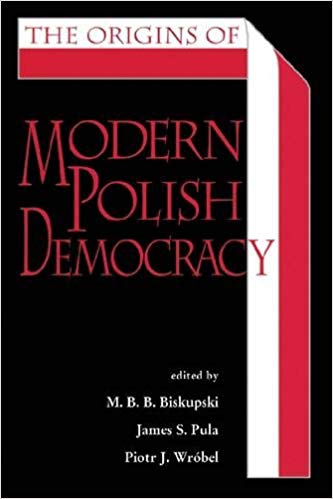Interwar Poland Undemocratic a Myth Biskupski

The Origins of Modern Polish Democracy, by Mieczyslaw B. Biskupski et al. (ed.) 2010
A Survey of Polish Democracy. Too Much LEWACTWO in This Anthology
This anthology of scholarly articles requires the reader to have a deep understanding of Polish politics in order to appreciate and evaluate fully. The articles discuss Polish democratic thought in the context of Poland’ s experiences with foreign rule, internal divisions, and large non-Polish populations, an alleged holdover feudal land system, and lukewarm to nonexistent support from western democracies.
Various chapters examine Polish Democratic thought under the Partitioning Powers, the Great War, the resurrection of the Polish state, the interwar period, the WWII German and Soviet occupations, the Polish government in exile, and the Communist-exiled Polish émigré communities. The remaining chapters deal with the struggle for a modicum of freedom in Communist-ruled Poland, the fall of Communism in 1989, and the succession of governments since then. The latter was complicated the fact that, unlike the situation in East Germany and Czechoslovakia, Poland never went through a lustration [lustracja] (that is, purification of the political parties of Communist elements)(p. 311).
THE LEFTIST AND JUDEOCENTRIC BIASES OF SOME OF THE AUTHORS OF THIS ANTHOLOGY
The articles seem to be generally free of tendentiousness, with some obvious exceptions. Robert E. Blobaum shows his pronounced Judeocentric slant as he unilaterally attacks Dmowski and Endek policies against the Jews. (p. 79). Blobaum is silent about the hostility of local Jews, notably the Litvaks (Litwaks), to Polish national aspirations- a hostility that had long preceded the Endeks. [See, for example, the Peczkis Amazon Wish List: Jews and Judaism in Tsarist Russia].
Amazingly, Blobaum actually equates the German liberals’ antagonism to the resistance of Prussian-ruled Poles to assimilation (Germanization) with Polish liberals’ antagonism to the Jewish resistance to assimilation. (p. 93). The comparison is egregious. Evidently, Blobaum has forgotten the elementary fact that German rule over western Poland was based on conquest (Partitions) and that the Germans had no right to be there and certainly had no right to Germanize the Poles. On the other hand, Poland’ s Jews were native to the Middle East, not Poland, had never been compelled by Poland to come or to stay, and were living in Poland solely as a favor of the Polish nation. Jewish subordination to Polish wishes was therefore a given. To top it all off, it was primarily the Jews, and not the host nations, that had long been resistant to Jewish assimilation.
PIASECKI AND PAX
On another subject, Andrzej Paczkowski writes of Boleslaw Piasecki’s “evolution” from ONR leader to Communist-conciliator. (p. 219). Regardless of his exact motives, Piasecki was as good as dead in Communist hands, so his choices were rather limited.
THE STANDARD LEWAK DUMP ON RADIO MARYJA
Piotr J. Wrobel displays his reputed neo-Stalinist tendencies as he maligns and misrepresents RADIO MARYJA. He repeats standard left-wing rhetoric, and fails to show any facts in support of his claims that RADIO MARYJA is “radical” (p. 303, 314), “anti-Semitic” , “chauvinistic” , etc. (p. 314). Then again, this is a broken record from the LEWACTWO and from the cultural Marxists.
To see a series of truncated reviews in a Category click on that Category:
- All reviews
- Anti-Christian Tendencies
- Anti-Polish Trends
- Censorship on Poles and Jews
- Communization of Poland
- Cultural Marxism
- German Guilt Dilution
- Holocaust Industry
- Interwar Polish-Jewish Relations
- Jewish Collaboration
- Jewish Economic Dominance
- Jews Antagonize Poland
- Jews Not Faultless
- Jews' Holocaust Dominates
- Jews' Holocaust Non-Special
- Nazi Crimes and Communist Crimes Were Equal
- Opinion-Forming Anti-Polonism
- Pogrom Mongering
- Poland in World War II
- Polish Jew-Rescue Ingratitude
- Polish Nationalism
- Polish Non-Complicity
- Polish-Ukrainian Relations
- Polokaust
- Premodern Poland
- Recent Polish-Jewish Relations
- The Decadent West
- The Jew as Other
- Understanding Nazi Germany
- Why Jews a "Problem"
- Zydokomuna